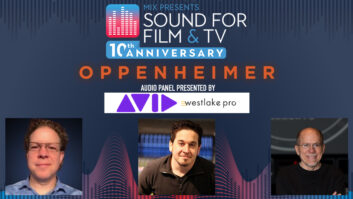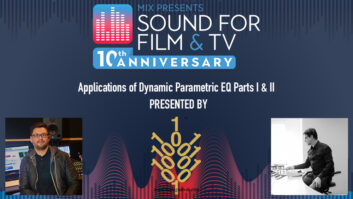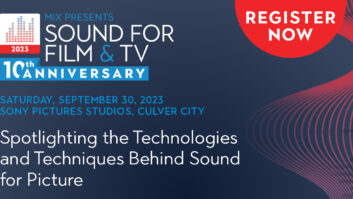NEW YORK, FEBRUARY 27, 2024 ― When it comes to horror films, production teams work hard to find new approaches to scare audiences. Today, with Dolby Atmos and immersive sound growing in popularity, there are even more ways to give viewers a fright. That’s exactly what Re-recording Mixer Jonathan Wales accomplishes for the horror shows and films on which he works, both as a freelancer and for Warner Brothers Studios.
Wales didn’t set out to specialize in horror, but a 30-year-long career path brought him there. “I tend to work on a lot of horror movies,” he says. “It wasn’t supposed to be that way, but when you start doing something well, people notice, and you end up doing more of it. It was an accidental career path, but it’s a fun genre to work in. Right now, there’s probably an even amount of time spent between original series content and horror films and shows.”
Among Wales’ most notable mixing projects are Netflix projects like “Haunting of Hill House,” “Midnight Mass” and “Fall of the House of Usher.” His feature-length film credits include “Insidious,” “The Red Door” and “The Black Phone.” When he’s not working on re-recording projects, Wales is also a scoring mixer and is credited with mixing the score for every Mike Flanagan project, from the first episode of “Haunting of Hill House” in 2018, forward.
Wales says he has also seen a change in the way directors and producers attack horror projects. “Over the past five to 10 years, there has been an increasing trend towards mixing in Atmos as the primary format,” he explains. “That requires us to have solutions that handle a lot of detailed format conversions like upmixing and downmixing, while simultaneously managing level specs. That’s how I’ve come to grow my relationship with NUGEN Audio.”
Wales credits the brand’s Halo Upmix as being one of his go-to tools. “It sounds natural and you can control what it’s doing in a very understandable way,” he continues. “It’s one thing to be able to make tweaks in a plug-in, it’s quite another to have them be predictable and do what you expect. That’s one great benefit of NUGEN plug-ins. Another thing I like about Halo Upmix is that it has relatively low latency. Some upmixing plug-ins have incredible processing delays and that’s not very useful. People in my line of work can’t use extremely high-latency plug-ins while working in real-time.”
Halo Upmix has become a staple on Wales’ scoring work as well. “It played a huge role on the ‘Fall of the House of Usher,’ ” he adds. “I use it on all sorts of audio elements, including things you wouldn’t expect—like individual stereo background files. Sometimes I like to deploy it just to see what happens. With music especially, there are always songs we try to make sound bigger. One of the great things about this plug-in is when you expand a track and then later have to fold it back down, your efforts aren’t working against you. There are plug-ins out there that do an okay job making tracks sound bigger, but when it comes time to make the tracks smaller, they start sounding really strange. Halo Upmix doesn’t suffer from that problem. It’s very up-down compatible. NUGEN was also one of the first companies that provided a way to fully upmix beyond 5.1, into Atmos, in a way that makes sense.”
As many of Wales’ latest projects are for Netflix, keeping his projects to spec has become especially critical. “We use NUGEN’s VisLM loudness meter as a sort of bible on level specs,” he says. “That plug-in is very important because it maintains a history of what you’ve been doing over the length of the program. So, if something isn’t quite in spec, you can find the exact placement of the problem and go directly to that section to make corrections. The results are reflected in real-time, so you can decipher if you’re making something better. It provides exceptional visual feedback of the information that you need.”
Wales says NUGEN Audio’s Halo Downmix is another of his go-to solutions. “There are many downmix plug-ins, and, to some degree, they all do the same thing, but Halo Downmix actually gives you a level of base management control when going from 5.1 to stereo,” he says. “Its feedback also massively exceeds all other plug-ins. As we’re having to cope with even larger formats folding down, I think Halo Downmix has become an increasingly important tool for me. It used to be that it didn’t make a difference which fold-down software you used, but all the extra tools you get from Halo Downmix are very important and they have a good reason to be there.”
As a longtime NUGEN user, Wales says “Halo Upmix, Halo Downmix and VisLM ̶ those three plug-ins are in every template I have. There is no scenario where I’m not using them. The plug-ins are very well written, by people who really care. When you’re using tools that are involved in your final delivery chain, that’s really important.”
Wales continues on, saying “The plug-ins are also very efficient. They’re not processor hogs that you can only use offline to experiment. When you get facetime with a director, you want to be able to make changes right there in real-time; these tools allow that. NUGEN is also very good at issuing updates for compatibility or corrections. That level of dependability is important. You want to use tools that you can trust, from companies that stand behind their solutions.”
For more information about NUGEN Audio products, visit: https://nugenaudio.com.







